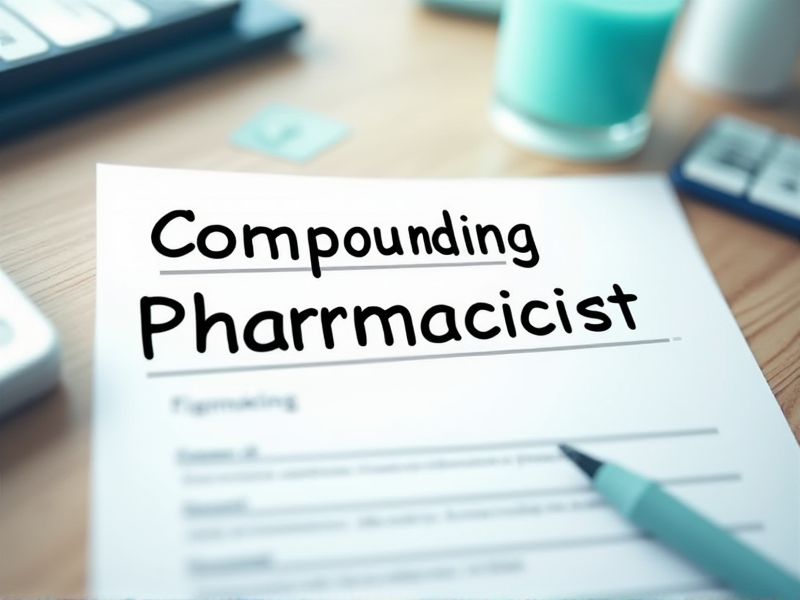
Compounding pharmacists create customized medications for patients, making adherence to safety and quality standards crucial. Certain certifications ensure that these professionals are knowledgeable about pharmaceutical compounding, sterile and non-sterile preparations, and adherence to regulatory guidelines. These certifications also help pharmacists maintain compliance with state and federal regulations, minimizing potential risks. Important certifications you may need for becoming a compounding pharmacist are outlined below.
Board Certified Sterile Compounding Pharmacist (BCSCP)
The complex nature of compounding medication requires verification by a Board Certified Sterile Compounding Pharmacist (BCSCP) to ensure precise formulation and patient safety. BCSCP certification validates a pharmacist's expertise in sterile compounding, critical for minimizing contamination and errors in medication preparation. Regulatory standards demand compliance, which BCSCPs are specifically trained to uphold, ensuring adherence to legal and safety protocols. As healthcare delivery evolves, BCSCPs play a pivotal role in advancing personalized medicine by providing tailored treatment options that standard pharmaceuticals might not address.
Board Certified Non-Sterile Compounding Pharmacist (BCNSCP)
Board Certified Non-Sterile Compounding Pharmacists (BCNSCP) possess specialized knowledge that ensures the safety and efficacy of customized medications. Their certification guarantees adherence to rigorous standards, reducing the risk of contamination or dosage errors in compounded medications. Patients with unique health needs rely on these pharmacists for precise formulations that cannot be met by standard pharmaceuticals. Health institutions benefit from their expertise in regulatory compliance and quality assurance, improving overall patient care.
Certified Compounding Pharmacist (CCP)
Having a Certified Compounding Pharmacist ensures adherence to strict standards, minimizing the risk of error in medication preparation. Certification provides assurance of up-to-date knowledge in compounding practices, reflecting a commitment to ongoing education. The role of the CCP addresses the unique needs of patients requiring customized medication therapies. Demand for specialized pharmaceutical solutions often increases, underscoring the need for professionally recognized expertise in compounding.
Pharmacy Compounding Accreditation Board (PCAB) Certification
The Pharmacy Compounding Accreditation Board (PCAB) Certification ensures a compounding pharmacist adheres to high safety and quality standards. Obtaining this certification enhances credibility, potentially increasing trust among patients and healthcare providers. It validates that the compounding practices meet regulatory compliance, minimizing risks of errors or contamination. Accreditation could lead to competitive advantages in the pharmacy market, attracting more clients seeking reliable compounded prescriptions.
Immunization Certification (APhA)
Immunization Certification from APhA equips compounding pharmacists with the skills to provide vaccinations, broadening their role in public health. This certification ensures pharmacists meet legal requirements and follow standardized practices, minimizing risk to patients. With the rise of vaccine-preventable diseases, certified pharmacists become vital in expanding community access to immunization services. Certification enhances professional credibility and can drive increased patient trust and engagement in pharmacy services.
Basic Life Support (BLS) Certification
Basic Life Support (BLS) certification equips compounding pharmacists with essential life-saving skills, enabling them to respond effectively to medical emergencies in clinical or pharmacy settings. The ability to perform CPR and use automated external defibrillators ensures that pharmacists can provide crucial support during critical incidents before professional medical help arrives. BLS knowledge enhances workplace safety and contributes to a comprehensive healthcare team that is better prepared for emergencies. By understanding these emergency protocols, compounding pharmacists align with industry standards for healthcare providers, promoting a safer environment for both patients and staff.
OSHA Compliance Certification
OSHA compliance certification ensures that compounding pharmacists adhere to safety standards, minimizing risks of exposure to hazardous chemicals. This certification helps reduce workplace accidents and protects both pharmacists and patients from potential health risks. By adhering to OSHA guidelines, pharmacies maintain a safer work environment, fostering operational efficiency and employee morale. Certification also demonstrates commitment to industry regulations, enhancing trust and credibility with clients and regulatory bodies.
HIPAA Compliance Training Certificate
A HIPAA Compliance Training Certificate is needed for a compounding pharmacist to ensure patient data confidentiality is maintained, reducing the risk of data breaches. It educates pharmacists on current regulations, helping them avoid legal liabilities associated with non-compliance. Proper training reinforces trust with patients by demonstrating a commitment to safeguarding personal health information. Pharmacies benefit from operational efficiency as trained staff are equipped to handle sensitive data following standardized procedures.
Medication Therapy Management (MTM) Certification
Medication Therapy Management (MTM) Certification equips compounding pharmacists with the expertise to optimize patient outcomes and ensure medication safety. The certification helps pharmacists tailor personalized medication plans, crucial for compounding where individualized doses are common. Compounding pharmacists benefit by improving interprofessional collaboration, ensuring they fully understand and implement best practices in medication management. MTM Certification enhances pharmacists' ability to assess medication efficacy and safety, ultimately improving patient trust and satisfaction.
Board Certified Pharmacotherapy Specialist (BCPS)
The complexity of treatment regimens often requires the specialized knowledge of a Board Certified Pharmacotherapy Specialist (BCPS) to ensure patient safety and efficacy in compounding formulations. BCPS certification provides pharmacists with an advanced understanding of pharmacokinetics and drug interactions, crucial for tailoring individualized compounded medications. The rigorous training and assessment that come with BCPS certification equip pharmacists with evidence-based approaches to optimize therapeutic outcomes. A BCPS-certified pharmacist can address clinical aspects of compounding, leading to better medication management and minimized risk of adverse effects.
Summary
When you obtain certifications as a compounding pharmacist, your credibility and trustworthiness can increase significantly. This enhanced professional standing often leads to greater patient confidence and potentially more referrals from healthcare providers. Certifications can also broaden your skill set, allowing you to offer a wider range of custom medications tailored to patient needs. As a result, your career opportunities and job satisfaction may experience notable growth.
